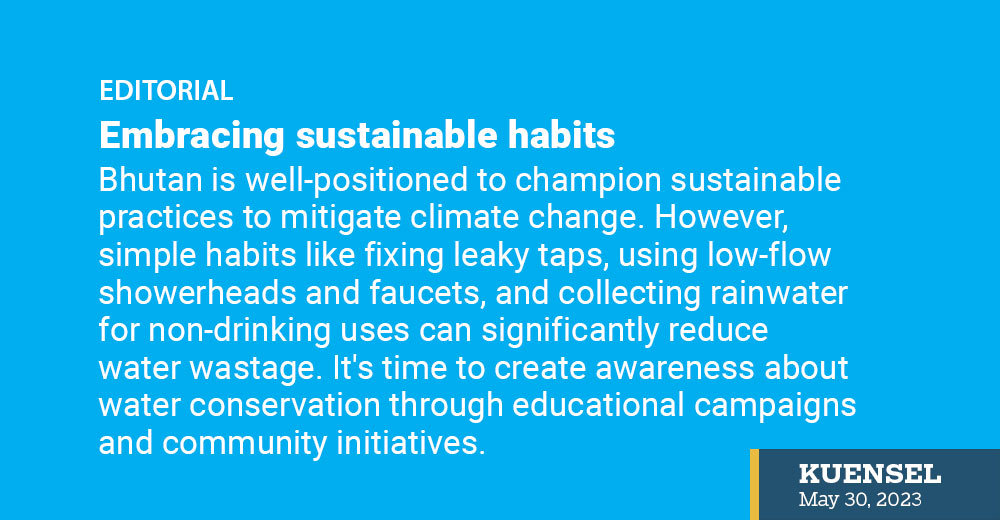As the world grapples with the ever-increasing challenges of climate change, it becomes imperative even for nations like Bhutan that have done the least to cause them to take immediate action to secure a sustainable future.
Bhutan, with its commitment to environmental conservation and well-being, is well-positioned to champion sustainable practices that mitigate adverse effects of climate change. This, however, doesn’t mean Bhutanese leave cutting trees altogether, not use fossil fuels, or give up agriculture because the sector produces greenhouse gases.
Embracing simple habits can result in big changes over time.
Experts are already projecting a rise in temperature by 3.2 degrees especially in the highlands of Bhutan triggered by greenhouse gas (GHG) emissions and economic development.
Bhutan’s mountainous terrain and abundant rainfall should not lull us into a false sense of security. Residents in urban areas are already experiencing water shortage in seasons when there used to be water in plenty. Each one of us must make a conscious effort to save water in our homes, offices, and public spaces. Simple practices like fixing leaky taps, using low-flow showerheads and faucets, and collecting rainwater for non-drinking uses can significantly reduce water wastage. It’s time we created awareness about water conservation through educational campaigns and community initiatives that foster a culture of responsible water usage across the nation.
Energy conservation plays a vital role in reducing greenhouse gas emissions and combating climate change. By being mindful of our energy consumption, especially in lighting, we can make a substantial difference. Turning off lights when they are not in use, utilising natural daylight whenever possible, and opting for energy-efficient and solar lighting solutions can significantly reduce our carbon footprint. Authorities can encourage structural designs that use as much natural light as possible so power consumption is minimised. This could also help in curbing our spending on power bills.
A study on the maximum and minimum baseline in temperature for the last 30 years between 1996 and 2022 showed that by 2050, transport sector will be the largest emitter of greenhouse gases. Rapid and sustained reductions in carbon dioxide, methane and other GHGs are necessary to limit further warming.
Our transportation remains a significant contributor to carbon emissions, particularly in urban areas. Bhutan, with its relatively small population and well-connected communities, has a unique advantage in promoting sustainable transportation practices. By choosing to walk, cycle, or carpool whenever feasible, we can reduce the number of vehicles on the road and curb air pollution. Authorities can also play a crucial role by investing in efficient public transportation systems, incentivising eco-friendly vehicles, and expanding cycling and pedestrian infrastructure to encourage sustainable modes of travel.
Consumerism and overconsumption are detrimental to the environment, leading to excessive resource depletion and waste generation. Adopting a mindful approach to consumption by buying only essential items or when needed can have a significant positive impact on our environment. By reducing unnecessary purchases, we can minimise waste, conserve natural resources, and promote a circular economy. We can also support local and sustainable businesses that prioritise environmental stewardship and ethical practices, further reinforcing sustainable consumption habits.
Imagine if each of us used water judiciously, conserved energy switching off lights when not needed, drove little – walked more, and bought only what we needed, then at the national level the combined efforts could save us billions of dollars that we could invest elsewhere. We could be doing ourselves and the world a big favour.


